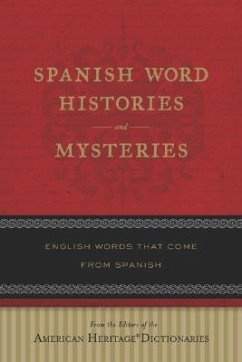Most people know that words like burrito and quesadilla come from Spanish, but there are many more English words that we would never suspect are Spanish until we look closely. Did you know that the words breeze and hammock come from Spanish? The jerky in beef jerky, for example, is from Spanish charquí, and the English verb vamoose is from the expression ?Vamos! which means Let's go! in Spanish.
Spanish Word Histories and Mysteries: English Words that Come from Spanish tells the fascinating stories behind 200 English words from Spanish. Every sphere of English vocabulary has been enriched by Spanish, from names for animals-alligator, coyote, and mosquito-to words for weather-hurricane and tornado. This book also explores the Spanish origin of some of the colorful expressions of the Old West: bonanza, loco, mustang, ranch, and ten-gallon hat. Of course, the book digs into the many words for different foods that come from Spanish-not only the obvious ones, such as salsa and taco, but also potato, tomato, caramel, vanilla, and, most important, chocolate. Photographs and line drawings enliven the pages and illustrate the history of the words.
Hinweis: Dieser Artikel kann nur an eine deutsche Lieferadresse ausgeliefert werden.
Spanish Word Histories and Mysteries: English Words that Come from Spanish tells the fascinating stories behind 200 English words from Spanish. Every sphere of English vocabulary has been enriched by Spanish, from names for animals-alligator, coyote, and mosquito-to words for weather-hurricane and tornado. This book also explores the Spanish origin of some of the colorful expressions of the Old West: bonanza, loco, mustang, ranch, and ten-gallon hat. Of course, the book digs into the many words for different foods that come from Spanish-not only the obvious ones, such as salsa and taco, but also potato, tomato, caramel, vanilla, and, most important, chocolate. Photographs and line drawings enliven the pages and illustrate the history of the words.
Hinweis: Dieser Artikel kann nur an eine deutsche Lieferadresse ausgeliefert werden.








